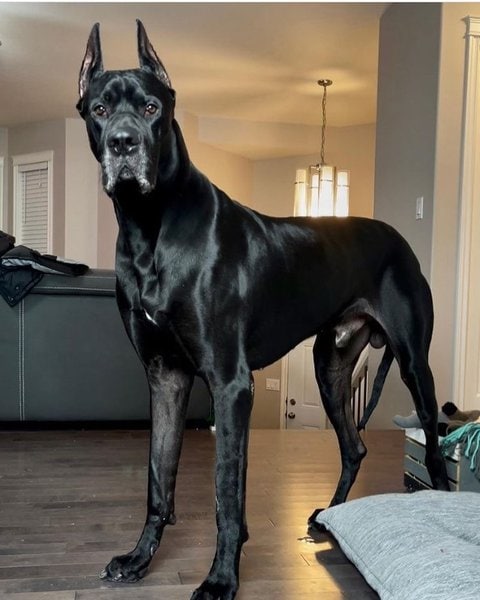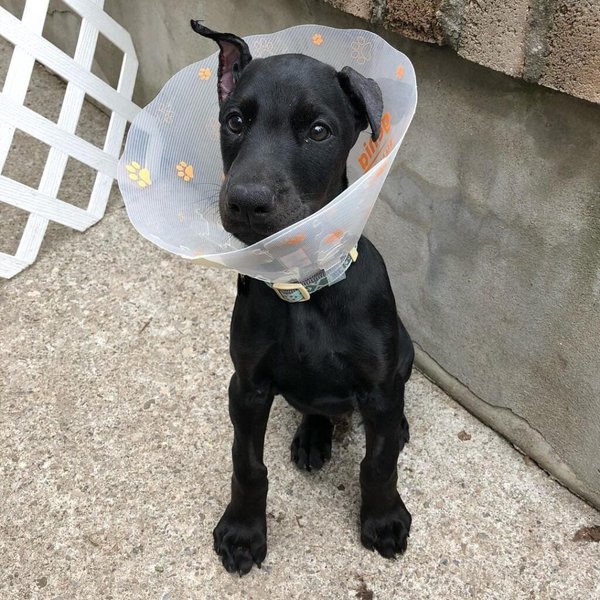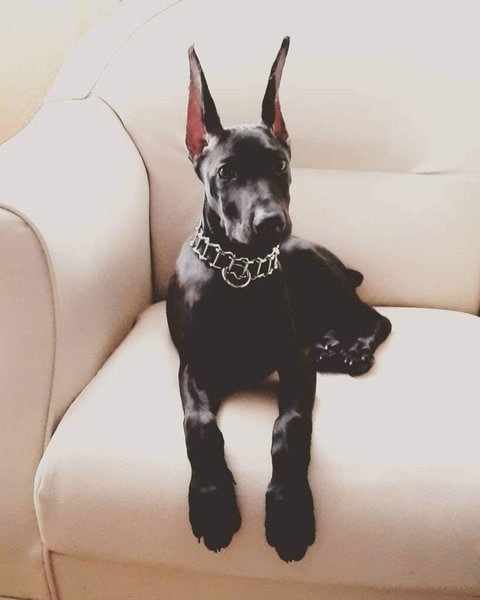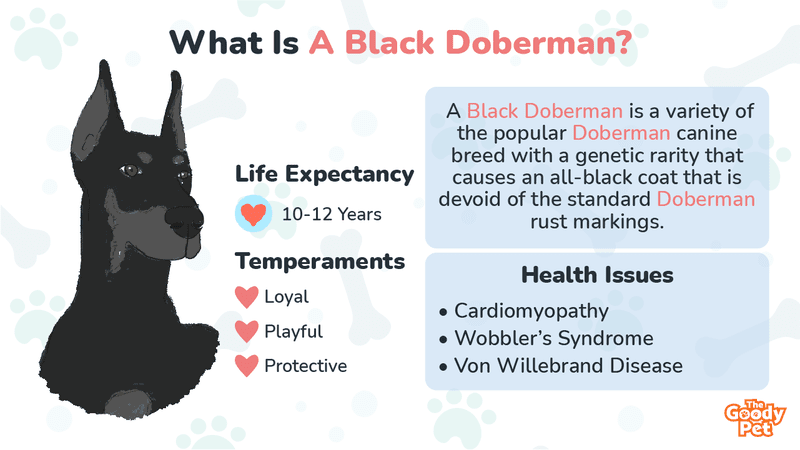Black Dobermans with visible tan markings are a common sight. But it is not every day you come across a Doberman with an all-black coat devoid of patterns or markings. Now, what is a black Doberman?
A Black Doberman is a variety of the popular Doberman canine breed with a genetic rarity that causes the production of excess melanin pigmentation. And the subsequent outcome of this excess melanin pigmentation is an all-black coat that is devoid of the standard Doberman rust markings.
Regardless of their unique coat colors, black Dobermans make wonderful pets, and are basically the same as their regular-colored Doberman counterparts when it comes to health and temperament; This article examines all you need to know about owning and raising one of these pooches. But, before we go further, let’s examine the origins of the black Doberman and the physical characteristics that distinguish this pooch from other canine breeds.
Are Black Dobermans Real?
While it is true that Dobermans typically come in a variety of colors, the standard Doberman colors typically consist of solid colors with rust markings. And as mentioned in the opening paragraph, an all-black Doberman coat is an extremely rare sight.
All-black Dobermans are not recognized by the American Kennel Club and most other official canine organizations, and there remains a great deal of controversy regarding the true origins of this pooch.
Appearance
Black Doberman Pinschers typically have athletic bodies with short, smooth fur that does an excellent job of accentuating their muscular and sturdy builds. Additionally, the black Doberman’s head is wedge-shaped and appropriately proportional to the rest of the body.
The black Doberman boasts almond-shaped eyes that are usually either hazel or brown in color, and triangular, high-set ears, coupled with a powerful jaw, contribute to this pooch’s menacing look.
Size
Black Dobermans are classified as a large dog breed, with males typically weighing between 75 to 100 lbs when fully grown. Female black Dobermans are slightly smaller than their male counterparts, and they typically weigh between 60 to 90 lbs as adults.
The Black Dobie is considerably tall, and both male and female pooches of this breed typically measure between 24 to 28 inches from ground to shoulder level when fully grown.
Coat
The sleek, smooth coat of the black Doberman comprises short hair with a fairly sparse density that lies very close to the pooch’s body.
As inferred by the name, black Dobermans are mostly available in a pure black coat with no tan markings. However, in some cases, it is possible to notice the presence of very faint tan markings on a Black Dobie, but these markings are usually not prominent.

Are All-Black Dobermans Healthy?
Black Dobermans, compared to other dog breeds, have relatively shorter lifespans, and they are typically expected to stay alive for between 10 to 12 years.
Black Dobies are generally healthy, but like all other dogs, can fall sick, if not properly taken care of. That said, some of the health conditions that black Dobermans are mostly predisposed to include:
Gastric Dilatation Volvulus
Gastric Dilatation Volvulus (commonly referred to as bloat) is a serious medical condition in canines that occurs when a black Doberman’s stomach rapidly fills with gas, food, or liquid. This rapid filling subsequently causes the pooch’s stomach to twist, and this is life-threatening for a Black Dobie.
Wobbler’s Syndrome
The Black Dobie is a large dog, and it is this that makes this pooch susceptible to wobbler’s syndrome, a medical condition that causes a compression of the dog’s spine, thereby resulting in wobbly movement and great pain for the dog.
Von Willebrand Disease
Black Dobermans suffering from Von Willebrand disease experience a bleeding disorder that is caused by an insufficiency of protein needed to aid platelets in sticking together and forming blood clots.
Von Willebrand disease is an inherited condition, and several studies have shown that the Doberman is the dog breed with the highest occurrence of this medical condition.
Cardiomyopathy
One of the most serious health conditions you have to be on the lookout for when raising a black Doberman is cardiomyopathy, a medical condition that is characterized by the degeneration of the dog’s heart muscles.
This degeneration causes the Black Dobie’s heart to become abnormally large, and if left unchecked, cardiomyopathy will eventually result in heart failure.
Other Health Issues
The occasional medical diagnosis of black Dobermans also includes:
- Cataracts
- Canine hepatitis
- Hip dysplasia
- Progressive Retinal Atrophy
- Narcolepsy
- Hypothyroidism

How To Take Care Of Black Dobermans?
Exercise Requirements
Black Dobermans are quite energetic, and this canine breed requires daily activity to maintain their strong and athletic builds.
Black Dobies need a minimum of 60 minutes of exercise per day, and a leisurely stroll around the block just won’t cut it for this pooch.
Exercises for black Dobermans can take the form of special agility courses. But games that allow this pooch to run around the yard or long, tasking hikes will also keep a Black Dobie fit.
Mental stimulation is equally as important for a Black Dobie, and owners should strive to provide this pooch with puzzles and interactive toys that will provide the needed stimulation.
Dietary Needs
Black Dobermans are a high-energy dog breed; Hence, the ideal meal for this pooch is one that is rich in protein and can meet the dog’s calorie requirements. And in addition to protein, Doberman food should also contain an appropriate level of fats and vitamins for large dog breeds to facilitate healthy growth and development.
The above nutritional requirements are typically met by feeding Black Dobies with high-quality dry kibble or well-processed wet dog food like the Pet Plate diet plan.
The Pet Plate diet is formulated from healthy natural ingredients that most Dobies enjoy eating. And these ingredients facilitate healthier weight development and shinier coats for black Dobermans, among other benefits.
Black Dobies averagely do well on three and a half cups of food per day, divided into two portions. And the exact amount of food you’ll need to feed your pooch depends on its age, size, and underlying health conditions, if any.
Dobermans also love food, and will continue eating as long as kibble is available; Hence, it is important that you are strict with your Black Dobie’s feeding to prevent the development of weight-related issues.
Are Black Dobermans Dangerous? Temperaments Of Black Dobermans
While it is true that Dobermans have a reputation for being a fierce and aggressive canine breed, a black Doberman is an extremely loyal and trustworthy dog that is very playful around family members.
Contrary to opinions held in some quarters, black Dobermans do not develop exceptional guard dog qualities when left alone to watch over the yard for long periods. And this pooch, like all other dogs, thrives best when it’s close to family. Also, a Black Dobie needs sufficient room to move around, and as such, this pooch may not do well in small apartments.
Black Dobermans make wonderful companions, but despite this pooch’s strong build and protective nature, it will only show its protective side whenever its family is in danger.
Interaction With Children And Pets
Black Dobermans get along excellently well with children, but this pooch is quite powerful, and interactions with small children should be closely supervised.
Black Dobies tend to be aggressive against dogs they aren’t raised with. And proper and early socialization is needed to ensure that a black Doberman gets along well with dogs and other household pets.
Intelligence And Training
Dobermans are one of the most intelligent dog breeds around, and this is one trait that is present in the Black Dobie.
Consequently, due to the Black Dobie’s high level of intelligence, coupled with its excellent memory and a deep-seated desire to obey its owners, this pooch is easy to train and teach new tricks.
Dobermans typically have a dominant streak and will assume the role of pack leader if left unchecked. Hence, you need to be firm and strong when raising a Black Dobie to ensure proper socialization.
Security
Black Dobermans are naturally very alert and suspicious of strangers, and their physical attributes make them perfectly suited for guard dog duties. And while a black Doberman typically doesn’t bark much, this pooch won’t hesitate to alert its family to potential danger.

How Much Hair Does A Black Doberman Shed? Grooming Tips For Black Dobermans
Black Dobermans, like the majority of all dog breeds, shed some hair, although the amount of hair that comes from this pooch’s body is considerably smaller, compared to the heavy-shedding canine breeds.
Also, black Dobermans are not hypoallergenic, and they may not be the ideal pet choice for those with dog allergies. That said, Black Dobermans are quite easy to maintain, and this is largely due to this doggie’s short fur.
Brushing
We’ve stated earlier that black Dobermans are a low-shedding dog breed, but you can further minimize the amount of fur that falls from this pooch by occasionally wiping down its body with a wet cloth.
Also, by regularly brushing your black Doberman’s coat with high-quality doggie brushes such as the FURminator Undercoat Tool, you can completely eliminate shedding in this pooch.
The FURminator Undercoat Tool reaches beneath the black Doberman’s top coat to get rid of loose, undercoat hair. And this task is made easier via the presence of a curved blade that conforms to the doggie’s body shape and an ergonomic handle design for convenient handling of the FURminator brush.
Bathing
Regular bathing is not necessary with a black Doberman, but regardless, you can bathe this pooch once every few months, when its coat gets too dirty or if it develops an odor.
When, eventually, you have to bathe your Black Dobie, it is recommended that you do so with warm water and specially formulated doggie shampoo products like the Mighty Petz 2-In-1 Oatmeal Dog Shampoo And Conditioner.
Formulated from natural products, the Mighty Petz shampoo is gentle on a Doberman’s skin, and the conditioner’s lavender smell will leave your pooch with a pleasant smell after bathing.
Additional Grooming Tips
- Occasionally check your black Doberman’s ears for dirt and signs of infection.
- Trim the Dobie’s nails monthly or whenever it becomes considerably long to prevent the pooch from harming itself.
- Frequently brush the pooch’s teeth to prevent the occurrence of oral diseases.
Related Questions
How Much Is A Black Doberman? Given that black Dobermans are considerably rare, you should be prepared to shell out between $1,500 to $2,500 to acquire a Dobie puppy from a reputable breeder. The exact amount you’ll pay varies according to location, but the pooch’s age and the breeder you’re buying from also contribute significantly to the final price.
Can Black Dobermans Swim? Yes, black Dobermans can swim. Black Dobermans are water-loving dogs, and these pooches love nothing more than to get into the water and splash around. However, swimming doesn’t come naturally to most Black Dobies; Hence, this pooch needs to be properly trained before being allowed to swim.
What Is The Bite Force Of A Black Doberman? Black Dobermans are one of the most powerful canine breeds in the world, and this is complemented by one of the strongest bite forces among all dogs. The bite force of a black Doberman typically ranges from between 228 to 305 PSI, and the exact value is largely influenced by the pooch’s health, size, and physical conditioning.





